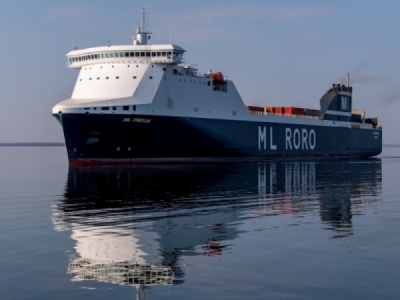
Posted on April 4, 2020
Unlike the neighbouring sea ports, Port of Rotterdam recorded breakbulk growth in 2019. In terms of combined transhipment of heavy lift, project cargo, steel, forest products, automotive and non-ferrous metals, a significant increase of 2.9 percent was recorded on an annual basis. Transhipment via Roll On/Roll Off ships also grew slightly. ‘Our ambition is to make Rotterdam the breakbulk hub of Europe,’ says Emile Hoogsteden, commercial director of the Port Authority.
The growth in breakbulk transhipment, excluding Ro-Ro, was attributable to the import of additional cargo packages and increased by 187,000 tonnes to 6.55 million tonnes. Export remained virtually unchanged.
New regular shipping service
Ro-Ro has also shown an increase, which ultimately led to a total of 24.25 million tonnes. With regards to Roll On/Roll Off transport, this applies not only on routes to the United Kingdom. For example, this year the English shipping company Mann Lines has included Rotterdam as a port of call in the North-West Europe route. ML Freyja visits Broekman Distriport in the Botlek once every nine days. This makes it the first Ro-Ro connection to be established with Turku and Paldiski (Finland), which opens up new possibilities for import and export.
‘With Mann Lines, we once again welcome a new regular service that connects the Port of Rotterdam to other regions,’ explains Twan Romeijn, Business Manager Breakbulk & Offshore Industry of the Port of Rotterdam Authority. ‘Attracting shipping companies is one of the spearheads of our strategy to commit even more breakbulk cargo to Rotterdam. Mann Lines fits this perfectly because of the focus on both Ro-Ro and other breakbulk. This makes a positive contribution to the wide-ranging breakbulk cluster.’
Buses and yachts
The roll on/roll off carrier ML Freyja measures 191.4 metres. Due to the 7-metre-high main deck, it is suitable for many types of breakbulk cargo, ranging from trucks and trailers to project cargo, tank containers, tractors, buses and yachts. The vessel’s route starts in Turku and proceeds from Finland to Bremerhaven and Harwich before entering Rotterdam.
The journey then continues to Cuxhaven and Estonian Paldiski, after which it ends in Turku again. Rail and road transport is provided via Paldiski to Central Asia (Kazakhstan, Turkmenistan, Uzbekistan and Mongolia) for containers, Ro-Ro and project cargo.

Source: Port Of Rotterdam
Source: hellenicshippingnews





